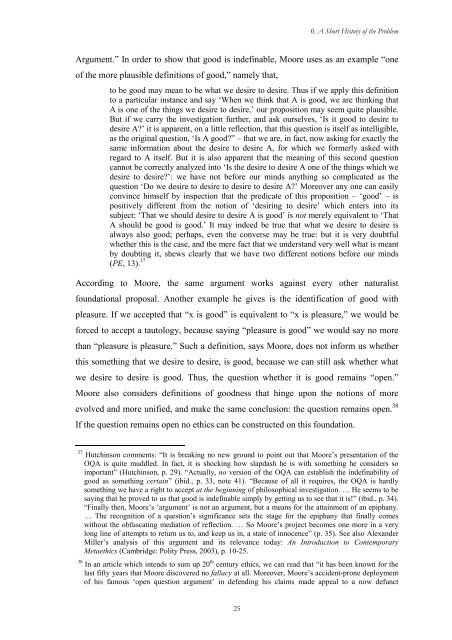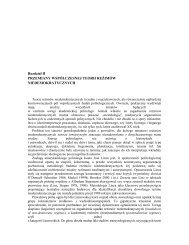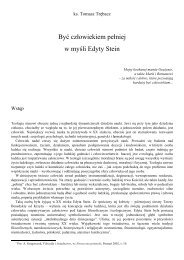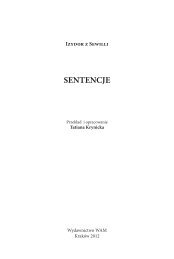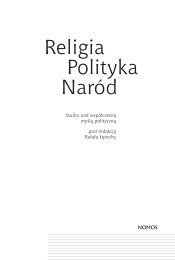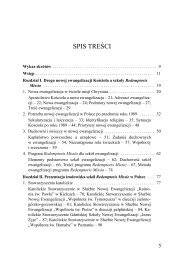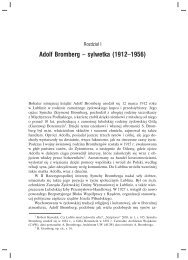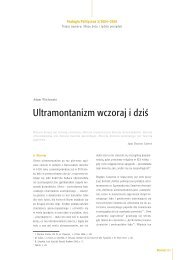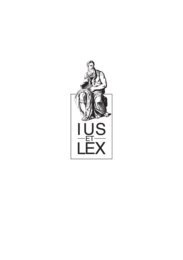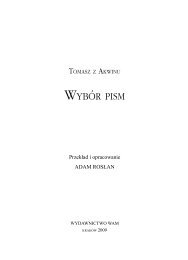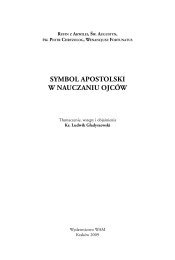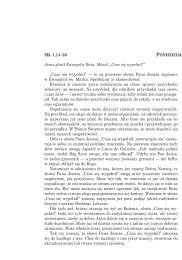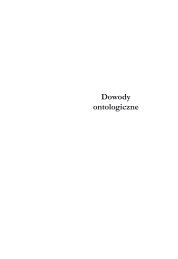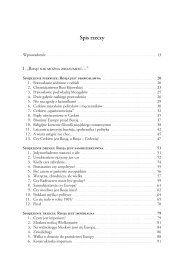Did St. Thomas Aquinas Justify the Transition from 'Is' to 'Ought'
Did St. Thomas Aquinas Justify the Transition from 'Is' to 'Ought'
Did St. Thomas Aquinas Justify the Transition from 'Is' to 'Ought'
Create successful ePaper yourself
Turn your PDF publications into a flip-book with our unique Google optimized e-Paper software.
25<br />
0. A Short His<strong>to</strong>ry of <strong>the</strong> Problem<br />
Argument.” In order <strong>to</strong> show that good is indefinable, Moore uses as an example “one<br />
of <strong>the</strong> more plausible definitions of good,” namely that,<br />
<strong>to</strong> be good may mean <strong>to</strong> be what we desire <strong>to</strong> desire. Thus if we apply this definition<br />
<strong>to</strong> a particular instance and say ‘When we think that A is good, we are thinking that<br />
A is one of <strong>the</strong> things we desire <strong>to</strong> desire,’ our proposition may seem quite plausible.<br />
But if we carry <strong>the</strong> investigation fur<strong>the</strong>r, and ask ourselves, ‘Is it good <strong>to</strong> desire <strong>to</strong><br />
desire A?’ it is apparent, on a little reflection, that this question is itself as intelligible,<br />
as <strong>the</strong> original question, ‘Is A good?” – that we are, in fact, now asking for exactly <strong>the</strong><br />
same information about <strong>the</strong> desire <strong>to</strong> desire A, for which we formerly asked with<br />
regard <strong>to</strong> A itself. But it is also apparent that <strong>the</strong> meaning of this second question<br />
cannot be correctly analyzed in<strong>to</strong> ‘Is <strong>the</strong> desire <strong>to</strong> desire A one of <strong>the</strong> things which we<br />
desire <strong>to</strong> desire?’: we have not before our minds anything so complicated as <strong>the</strong><br />
question ‘Do we desire <strong>to</strong> desire <strong>to</strong> desire <strong>to</strong> desire A?’ Moreover any one can easily<br />
convince himself by inspection that <strong>the</strong> predicate of this proposition – ‘good’ – is<br />
positively different <strong>from</strong> <strong>the</strong> notion of ‘desiring <strong>to</strong> desire’ which enters in<strong>to</strong> its<br />
subject: ‘That we should desire <strong>to</strong> desire A is good’ is not merely equivalent <strong>to</strong> ‘That<br />
A should be good is good.’ It may indeed be true that what we desire <strong>to</strong> desire is<br />
always also good; perhaps, even <strong>the</strong> converse may be true: but it is very doubtful<br />
whe<strong>the</strong>r this is <strong>the</strong> case, and <strong>the</strong> mere fact that we understand very well what is meant<br />
by doubting it, shews clearly that we have two different notions before our minds<br />
(PE, 13). 37<br />
According <strong>to</strong> Moore, <strong>the</strong> same argument works against every o<strong>the</strong>r naturalist<br />
foundational proposal. Ano<strong>the</strong>r example he gives is <strong>the</strong> identification of good with<br />
pleasure. If we accepted that “x is good” is equivalent <strong>to</strong> “x is pleasure,” we would be<br />
forced <strong>to</strong> accept a tau<strong>to</strong>logy, because saying “pleasure is good” we would say no more<br />
than “pleasure is pleasure.” Such a definition, says Moore, does not inform us whe<strong>the</strong>r<br />
this something that we desire <strong>to</strong> desire, is good, because we can still ask whe<strong>the</strong>r what<br />
we desire <strong>to</strong> desire is good. Thus, <strong>the</strong> question whe<strong>the</strong>r it is good remains “open.”<br />
Moore also considers definitions of goodness that hinge upon <strong>the</strong> notions of more<br />
evolved and more unified, and make <strong>the</strong> same conclusion: <strong>the</strong> question remains open. 38<br />
If <strong>the</strong> question remains open no ethics can be constructed on this foundation.<br />
37 Hutchinson comments: “It is breaking no new ground <strong>to</strong> point out that Moore’s presentation of <strong>the</strong><br />
OQA is quite muddled. In fact, it is shocking how slapdash he is with something he considers so<br />
important” (Hutchinson, p. 29). “Actually, no version of <strong>the</strong> OQA can establish <strong>the</strong> indefinability of<br />
good as something certain” (ibid., p. 33, note 41). “Because of all it requires, <strong>the</strong> OQA is hardly<br />
something we have a right <strong>to</strong> accept at <strong>the</strong> beginning of philosophical investigation. … He seems <strong>to</strong> be<br />
saying that he proved <strong>to</strong> us that good is indefinable simply by getting us <strong>to</strong> see that it is!” (ibid., p. 34).<br />
“Finally <strong>the</strong>n, Moore’s ‘argument’ is not an argument, but a means for <strong>the</strong> attainment of an epiphany.<br />
… The recognition of a question’s significance sets <strong>the</strong> stage for <strong>the</strong> epiphany that finally comes<br />
without <strong>the</strong> obfuscating mediation of reflection. … So Moore’s project becomes one more in a very<br />
long line of attempts <strong>to</strong> return us <strong>to</strong>, and keep us in, a state of innocence” (p. 35). See also Alexander<br />
Miller’s analysis of this argument and its relevance <strong>to</strong>day: An Introduction <strong>to</strong> Contemporary<br />
Metaethics (Cambridge: Polity Press, 2003), p. 10-25.<br />
38 In an article which intends <strong>to</strong> sum up 20 th century ethics, we can read that “it has been known for <strong>the</strong><br />
last fifty years that Moore discovered no fallacy at all. Moreover, Moore’s accident-prone deployment<br />
of his famous ‘open question argument’ in defending his claims made appeal <strong>to</strong> a now defunct


